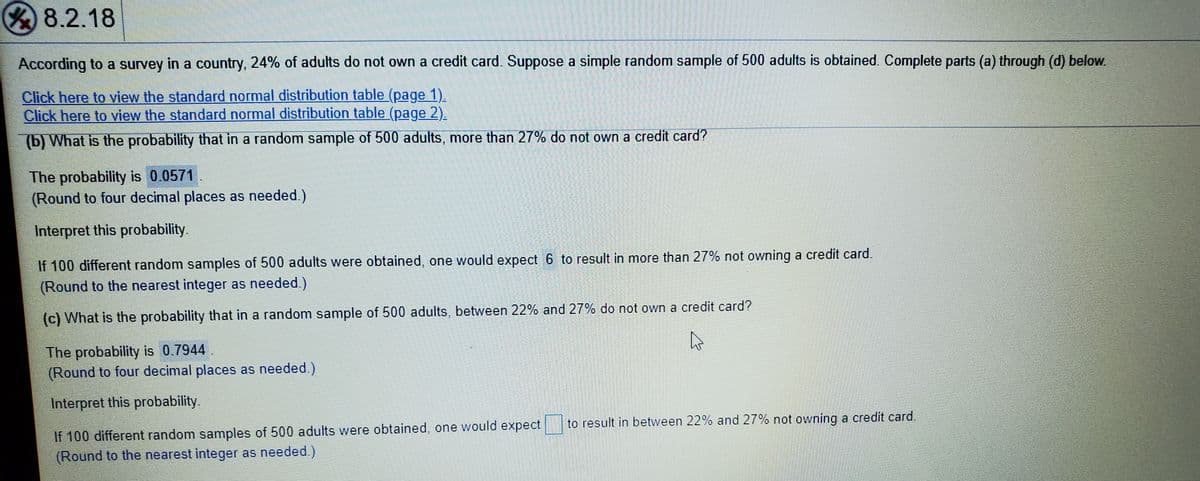According to a survey in a country, 24% of adults do not own a credit card. Suppose a simple random sample of 500 adults is obtained. Complete parts (a) through (d) below. Click here to view the standard normal distribution table (page 1). Click here to view the standard normal distribution table (page 2). (b) What is the probability that in a random sample of 500 adults, more than 27% do not own a credit card? The probability is 0.0571. (Round to four decimal places as needed.) Interpret this probability. If 100 different random samples of 500 adults were obtained, one would expect 6 to result in more than 27% not owning a credit card. (Round to the nearest integer as needed.) (c) What is the probability that in a random sample of 500 adults, between 22% and 27% do not own a credit card? The probability is 0.7944 (Round to four decimal places as needed.) Interpret this probability. If 100 different random samples of 500 adults were obtained, one would expect to result in between 22% and 27% not owning a credit card. (Round to the nearest integer as needed.)
According to a survey in a country, 24% of adults do not own a credit card. Suppose a simple random sample of 500 adults is obtained. Complete parts (a) through (d) below. Click here to view the standard normal distribution table (page 1). Click here to view the standard normal distribution table (page 2). (b) What is the probability that in a random sample of 500 adults, more than 27% do not own a credit card? The probability is 0.0571. (Round to four decimal places as needed.) Interpret this probability. If 100 different random samples of 500 adults were obtained, one would expect 6 to result in more than 27% not owning a credit card. (Round to the nearest integer as needed.) (c) What is the probability that in a random sample of 500 adults, between 22% and 27% do not own a credit card? The probability is 0.7944 (Round to four decimal places as needed.) Interpret this probability. If 100 different random samples of 500 adults were obtained, one would expect to result in between 22% and 27% not owning a credit card. (Round to the nearest integer as needed.)
A First Course in Probability (10th Edition)
10th Edition
ISBN:9780134753119
Author:Sheldon Ross
Publisher:Sheldon Ross
Chapter1: Combinatorial Analysis
Section: Chapter Questions
Problem 1.1P: a. How many different 7-place license plates are possible if the first 2 places are for letters and...
Related questions
Question

Transcribed Image Text:Y8.2.18
According to a survey in a country, 24% of adults do not own a credit card. Suppose a simple random sample of 500 adults is obtained. Complete parts (a) through (d) below.
Click here to view the standard normal distribution table (page 1).
Click here to view the standard normal distribution table (page 2).
(b) What is the probability that in a random sample of 500 adults, more than 27% do not own a credit card?
The probability is 0.0571.
(Round to four decimal places as needed.)
Interpret this probability.
If 100 different random samples of 500 adults were obtained, one would expect 6 to result in more than 27% not owning a credit card.
(Round to the nearest integer as needed.)
(c) What is the probability that in a random sample of 500 adults, between 22% and 27% do not own a credit card?
The probability is 0.7944.
(Round to four decimal places as needed.)
Interpret this probability.
to result in between 22% and 27% not owning a credit card.
If 100 different random samples of 500 adults were obtained, one would expect
(Round to the nearest integer as needed.)
Expert Solution
This question has been solved!
Explore an expertly crafted, step-by-step solution for a thorough understanding of key concepts.
This is a popular solution!
Trending now
This is a popular solution!
Step by step
Solved in 2 steps with 8 images

Knowledge Booster
Learn more about
Need a deep-dive on the concept behind this application? Look no further. Learn more about this topic, probability and related others by exploring similar questions and additional content below.Recommended textbooks for you

A First Course in Probability (10th Edition)
Probability
ISBN:
9780134753119
Author:
Sheldon Ross
Publisher:
PEARSON


A First Course in Probability (10th Edition)
Probability
ISBN:
9780134753119
Author:
Sheldon Ross
Publisher:
PEARSON
